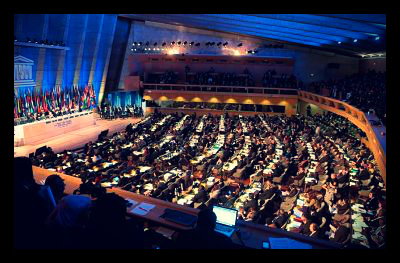Ruptured U.S. – UNESCO Relationship

The U.S. relationship with UNESCO is taking a turn for the worse as the U.S. loses voting rights in the organization. UNESCO voted in Palestine as a member state in 2011 despite U.S. threats of halting funding to the UN organization.
The U.S. boycott resulted in inactivity for two years. As stated in UNESCO’s constitution, two years of member inactivity results in a loss of voting ability.
Formerly, the U.S. provided 22% of the United Nations Educational, Scientific and Cultural Organization’s budget, approximately $80 million a year. Under U.S. law, organizations that recognize the Palestine Liberation Organization as a member state will be denied financial support.
A two-thirds approval vote for membership resulted in 107 to 14 with 15 abstentions, effectively passing Palestine to be the 195th full member. This is differentiated from Palestine’s membership with the United Nations, a bid that Palestine failed to accomplish.
Previously in 2011, shortfall of the $65 million originally pledged by the U.S., UNESCO began emergency fundraising efforts for its 2012-2013 budget. As reported by CNN, UNESCO director-general Irina Bokova reevaluated every aspect of the organization from projects to contractual commitments. Currently, the 2014 budget is reduced by $150 million.
Bokova met with legislators in an attempt to change the language of U.S. law, to no avail. Bokova has stated that a second emergency fundraiser from contributing nations is not possible for the following year.
UNESCO establishes heritage sites and propels initiatives that push for education, culture and science worldwide. From education reform, particularly women’s education, to clean water access and tsunami research, UNESCO oversees a wide set of programs.
For its part, the U.S. not only loses soft-power influence through its relationship with UNESCO but misses an opportunity in creating two separate UNESCO sites in the U.S.: Spanish missions in San Antonio and an ancient civilization site in Poverty Point, Louisiana. The ensuing established heritage sites would have increased tourism and established jobs.
U.S. influence and interests are overlooked through inactivity in UNESCO. The U.S.’ relationship with UNESCO began in 1945 through support and funding. A boycott by the U.S. against UNESCO lasted between 1984 to 2003, the former disagreeing with the latter’s supposed anti-Western policies. Since the U.S. readmission in 2003, the country pushed for greater Holocaust and genocide education. A mission utilized in Africa to promote ethnic tolerance and educate about nondiscrimination and nonviolence.
In addition to the U.S., Israel has pulled its 3% contribution off the UNESCO budget and equally lost voting privilege. The U.S. criticizes Palestine’s bid for recognition via the UN as a chief hindrance for improving negotiations between Palestine and Israel.
As an organization known for spreading freedom of expression, among others, UNESCO loses a mutually-beneficial donor with its current relation with the U.S.
– Miles Abadilla
